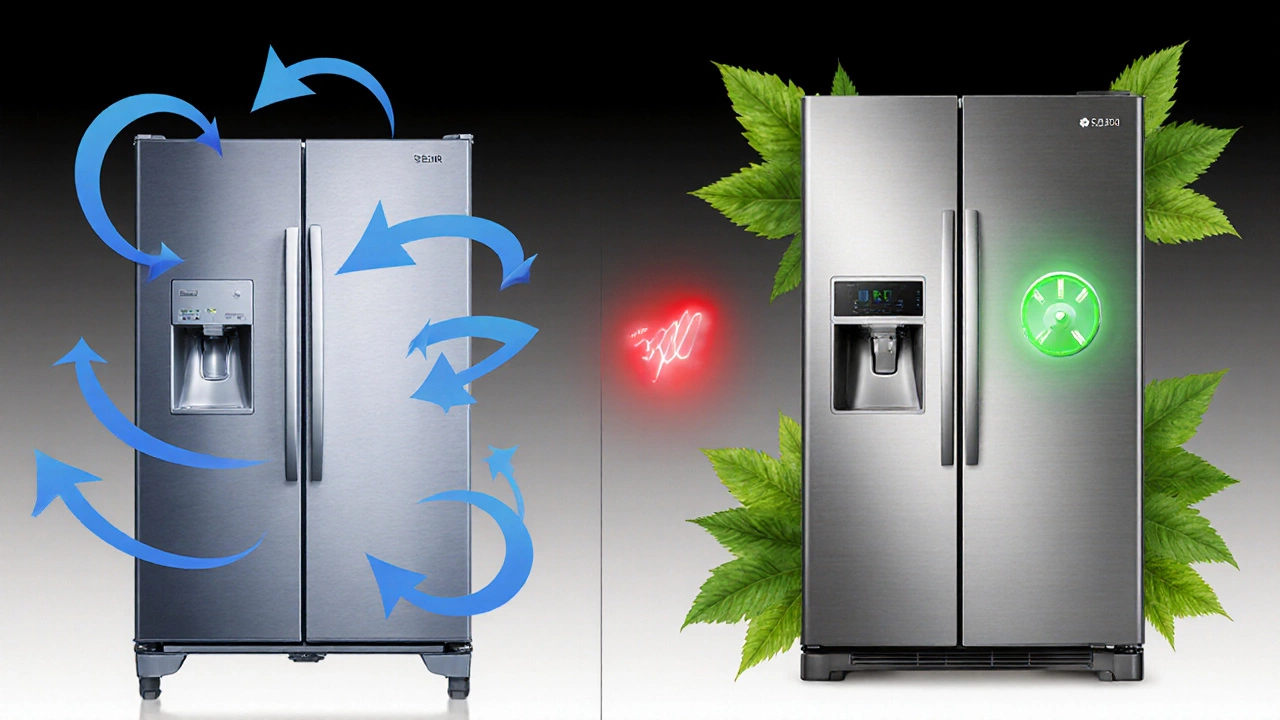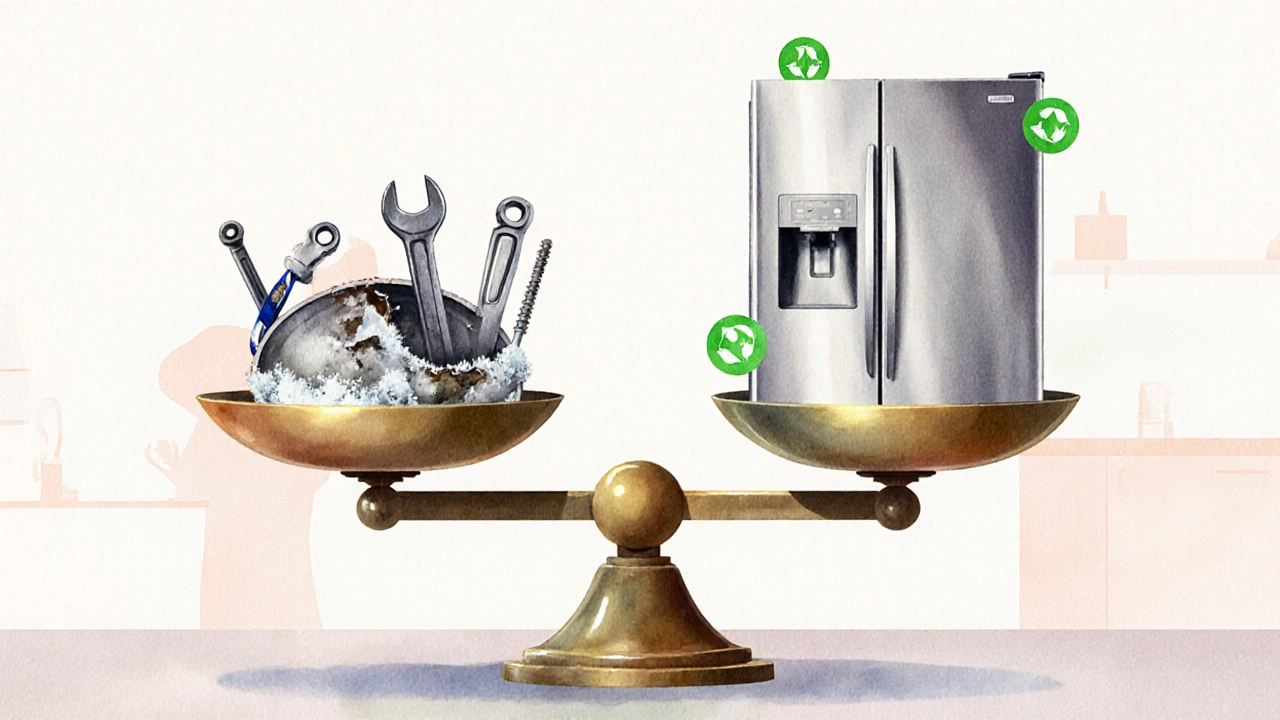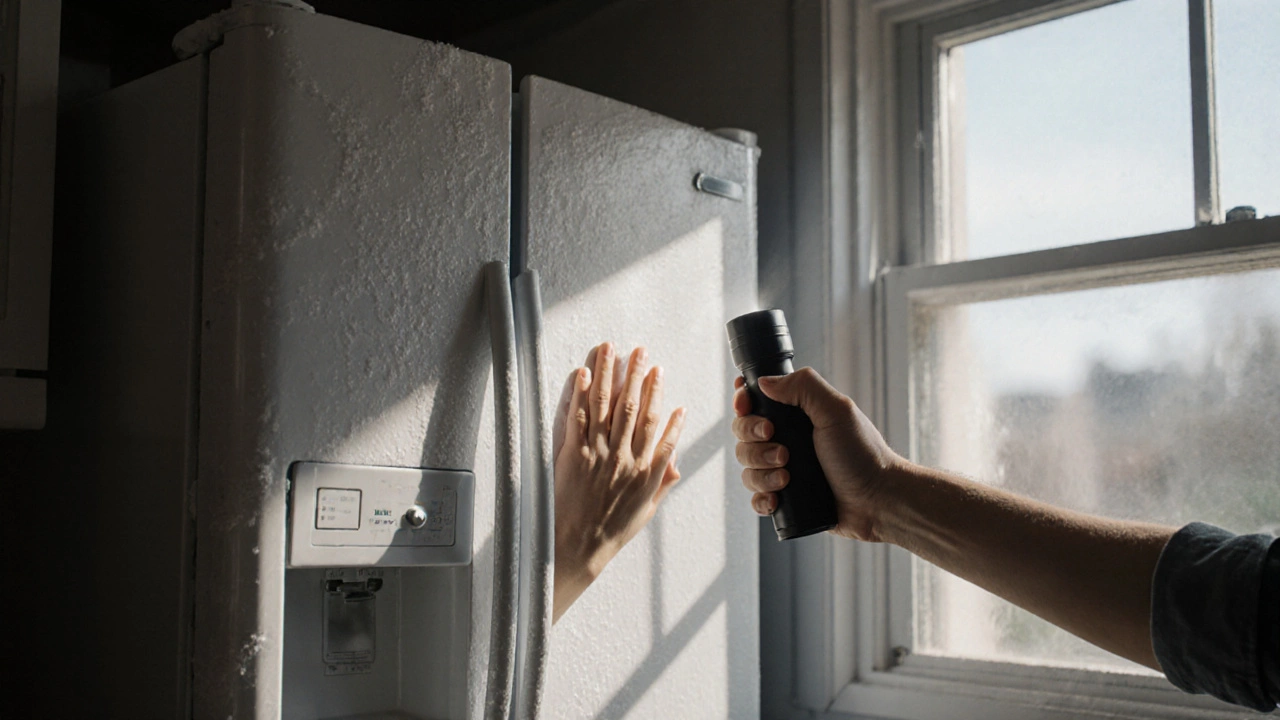Fridge Freezer Repair vs Replace Calculator
Cost Analysis Tool
Calculate whether repairing or replacing your 7-year-old fridge freezer makes the most financial sense.
Recommendation
Cost Comparison
Energy Savings
Energy Efficiency Note: Replacing a 3-star rated unit with a 5-star model can reduce electricity consumption by 30-40%.
When your fridge freezer a combined refrigerator and freezer unit used for home food storage starts acting up at seven years old, the first thought is usually, “Do I fix it or buy a new one?” The answer isn’t black‑and‑white; it depends on a handful of facts that you can check in a couple of minutes.
How to Spot the Real Problem
Before you even call anyone, try to pinpoint what’s wrong. Common culprits in a seven‑year‑old unit are a failing compressor the motor that circulates refrigerant throughout the cooling system, a broken thermostat the temperature‑control sensor that tells the fridge when to cool, or a leak in the refrigerant the cooling fluid that absorbs heat inside the appliance. Listen for humming noises, feel for uneven cooling, and check for frost buildup in the freezer compartment. These clues will guide the next steps.
Crunching the Numbers: Repair Cost vs Replacement Cost
Most people base the decision on money. Below is a quick snapshot of typical costs in New Zealand (2025 figures). These numbers are averages; your local rates may vary.
| Scenario | Average Cost (NZD) | Typical Lifespan After Fix |
|---|---|---|
| Minor part replacement (door seal, thermostat) | 80‑150 | 5‑7 years |
| Compressor swap | 300‑550 | 8‑10 years |
| Full unit replacement (energy‑efficient model) | 900‑1,500 | 15+ years |
As a rule of thumb, if the repair bill climbs above half the price of a new, energy‑star appliance, it’s usually smarter to replace. That’s where the fridge freezer repair decision gets tricky - you have to consider not just the upfront cost but also future savings.
Energy Efficiency: The Hidden Savings
Older models often carry a low energy efficiency rating a label that rates how much electricity an appliance uses compared to newer standards. A seven‑year‑old unit typically sits at a 3‑star rating, consuming roughly 30‑40% more electricity than a modern 5‑star fridge. Over a year, that can translate to an extra $150‑$200 on your power bill.
If you choose to repair, ask your professional technician a licensed specialist who services household appliances whether any efficiency upgrades are possible - sometimes a new compressor or a sealed‑system refill can boost the rating by a star or two.

Environmental Impact: Waste vs Repair
Discarding a fridge freezer means dealing with a bulky item that often ends up in a landfill, releasing refrigerant gases that harm the ozone layer. By repairing, you extend the life of the metal housing, plastic components, and the refrigerant system, reducing the carbon footprint associated with manufacturing a new unit.
Newer machines are also built with recyclable materials and greener refrigerants (like R‑600a). If you’re eco‑conscious, factor the environmental cost of a new purchase against the relatively small waste generated by a part swap.
Warranty and Guarantees: Who’s Covered?
Check whether your fridge freezer still has an active manufacturer’s warranty. Some brands extend coverage to seven years for major components. Even if the warranty expired, many reputable repair services companies that offer guarantees on parts and labour provide a 90‑day guarantee on workmanship. Weigh that against the typical 2‑year warranty that comes with a new appliance.
DIY Repair: When to Roll Up Your Sleeves
If you’re handy, you might tackle a simple seal replacement or a thermostat swap yourself. Online video guides and forums (e.g., ApplianceRepair.co.nz) walk you through the steps. Just remember:
- Always unplug the unit before opening any panels.
- Handle refrigerant lines with care - leaks can be hazardous.
- Note the model number and part numbers; buying the wrong part adds cost.
For anything involving the compressor or sealed‑system refrigerant, call a certified technician. DIY attempts on those parts can void warranties and pose safety risks.

When Replacement Makes Sense
Replace the fridge freezer if you meet any of these conditions:
- The repair estimate exceeds 50% of a comparable new model’s price.
- Your unit is a single‑door design with poor insulation, leading to high energy bills.
- Frequent breakdowns have occurred over the past two years.
- The appliance is out of warranty and the technician recommends a full sealed‑system overhaul.
Buying a new, Energy Star‑rated fridge freezer not only cuts electricity costs but also usually comes with a 2‑year guarantee that covers parts and labour - a safety net you don’t have with an old unit.
Quick Decision Checklist
- Identify the fault (compressor, thermostat, refrigerant, door seal).
- Get at least two repair quotes.
- Compare the higher quote to the price of a new, energy‑efficient model.
- Calculate potential yearly energy savings with a better rating.
- Factor in environmental impact and warranty coverage.
- Choose repair if total cost <50% of new unit price and savings are modest; otherwise, replace.
Follow this list, and you’ll make a reasoned choice without second‑guessing later.
Frequently Asked Questions
How long should a fridge freezer last before it’s cheaper to replace?
Most modern units are built for a 10‑15year lifespan. If you’re hitting the 7‑year mark and repairs cost more than half the price of a new, energy‑efficient model, replacement is usually the smarter financial move.
Can I replace the compressor myself?
Unless you’re a certified refrigeration technician, it’s not recommended. Compressor work involves handling refrigerant, which requires special tools and safety procedures.
What are the energy savings of a new 5‑star fridge freezer?
A typical 5‑star model uses about 30% less electricity than a 3‑star unit of the same size. On a $2,000 annual electricity bill, that translates to roughly $600 saved over ten years.
Is there a disposal fee for throwing out an old fridge freezer?
Yes. Local councils in New Zealand charge between $30‑$80 for bulky waste pickup, and some retailers offer free removal when you buy a new appliance.
Should I consider a semi‑new (refurbished) fridge freezer?
Refurbished units can be a good middle ground. They often come with a 1‑year warranty and are priced 20‑30% below brand‑new models, while still offering better energy ratings than an old appliance.
Bottom line: A seven‑year‑old fridge freezer isn’t automatically a write‑off. By checking the fault, estimating repair costs, and weighing energy and environmental factors, you can decide whether a fix or a fresh start gives you the best bang for your buck.
